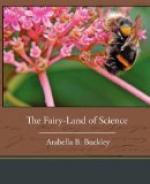Only you must with to see them. If you go through the world looking upon everything only as so much to eat, to drink, and to use, you will never see the fairies of science. But if you ask yourself why things happen, and how the great God above us has made and governs this world of ours; If you listen to the wind, and care to learn why it blows; if you ask the little flower why it opens in the sunshine and closes in the storm; and if when you find questions you cannot answer, you will take the trouble to hunt out in books, or make experiments to solve your own questions, then you will learn to know and love those fairies.
Mind, I do not advise you to be constantly asking questions of other people; for often a question quickly answered is quickly forgotten, but a difficulty really hunted down is a triumph for ever. For example, if you ask why the rain dries up from the ground, most likely you will be answered, “that the sun dries it,” and you will rest satisfied with the sound of the words. But if you hold a wet handkerchief before the fire and see the damp rising out of it, then you have some real idea how moisture may be drawn up by heat from the earth.
A little foreign niece of mine, only four years old, who could scarcely speak English plainly, was standing one morning near the bedroom window and she noticed the damp trickling down the window-pane. “Auntie,” she said, “what for it rain inside?” It was quite useless to explain to her in words, how our breath had condensed into drops of water upon the cold glass; but I wiped the pane clear, and breathed on it several times. When new drops were formed, I said, “Cissy and auntie have done like this all night in the room.” She nodded her little head and amused herself for a long time breathing on the window-pane and watching the tiny drops; and about a month later, when we were travelling back to Italy, I saw her following the drops on the carriage window with her little finger, and heard her say quietly to herself, “Cissy and auntie made you.” Had not even this little child some real picture in her mind of invisible water coming from her mouth, and making drops upon the window-pane?
Then again, you must learn something of the language of science. If you travel in a country with no knowledge of its language, you can learn very little about it: and in the same way if you are to go to books to find answers to your questions, you must know something of the language they speak. You need not learn hard scientific names, for the best books have the fewest of these, but you must really understand what is meant by ordinary words.
For example, how few people can really explain the difference between a solid, such as the wood of the table; a liquid, as water; and a gas, such as I can let off from this gas-jet by turning the tap. And yet any child can make a picture of this in his mind if only it has been properly put before him.




